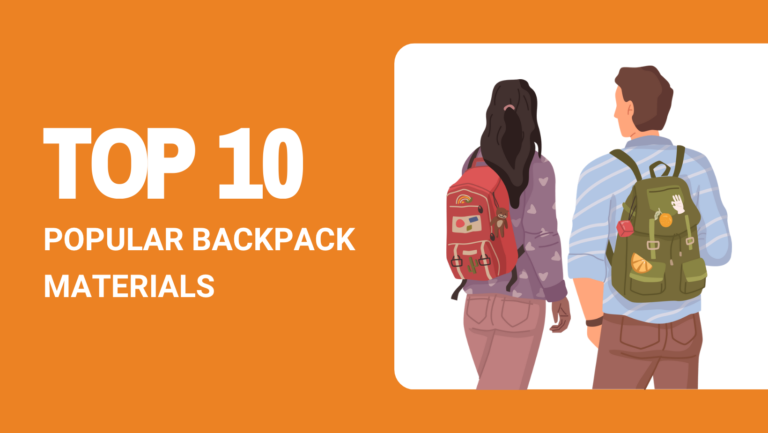Do you know what to look for while shopping for backpacks? This might be an easy answer for some, but for retailers, you need to be familiar with the different materials used to make backpacks. How is this helpful?
Working with different clients with different tastes in fashion can be a handful. Understanding the various backpack materials available and what they offer is critical. This way, your customers will get the best deal for their needs.
Follow this guide to get an inside look of all the fabrics used to make backpacks. Let’s get started.
What Are Backpacks Made Of?
Nylon
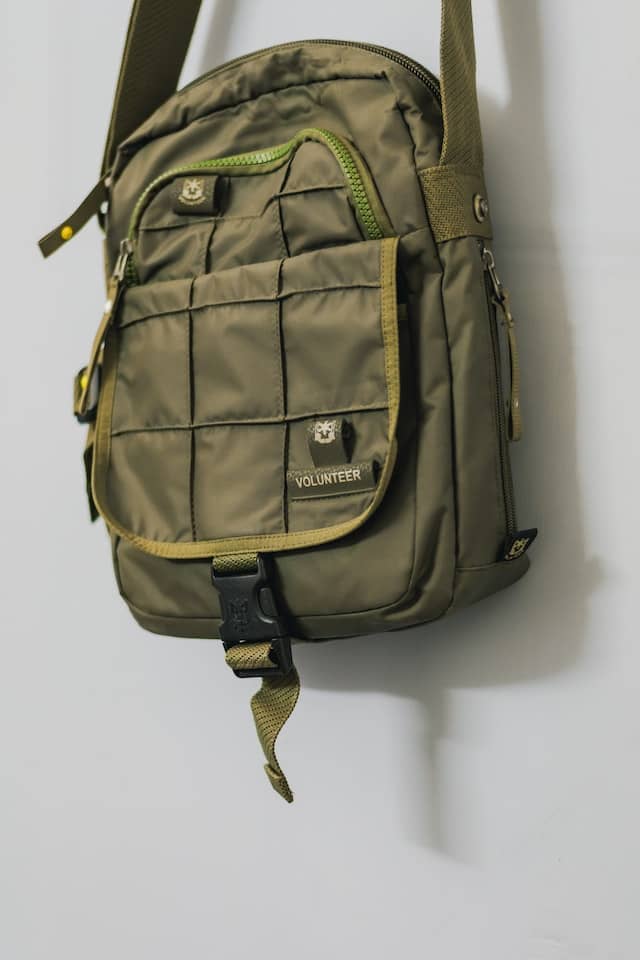
Being one of the most popular synthetic fibers, nylon is used in various ways. Making backpacks is one of the best ways to use this material, and it has become the most used material.
Due to its properties, nylon permits designers to create uniquely shaped products that are impossible to match.
Pros
- Nylon is a strong fabric that can handle heavy loads and is durable.
- It is water-resistant, hence, it is the perfect backpack material. You can carry delicate things such as laptops and books.
- Nylon backpacks are resistant to abrasion.
- If you need a lightweight bag, then this is the best for your customers.
Cons
- Nylon stains easily, meaning you must wash it frequently.
- It is slightly expensive compared to other materials.
- In terms of fashion, it is not the trendiest fabric to go for.
- UV rays damage the fabric if not treated.
Ballistic Nylon
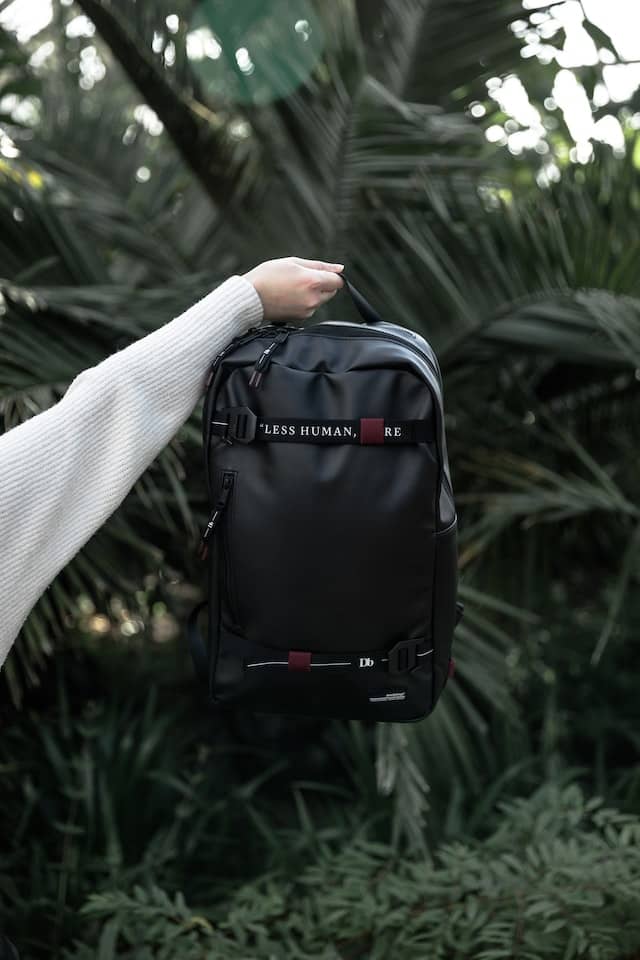
This fabric was made to be used in the military. It was supposed to be used to make protective gear, but was not as effective as intended. However, the material is suitable for making other products, such as backpacks.
Ballistic nylon is still nylon, but with a different type of weave pattern, making it more durable and stronger.
Pros
- It is an easy material to clean, reducing the workload.
- It is stronger and more durable than regular nylon.
- Ballistic nylon has excellent tear-resistant properties.
- It is waterproof; hence able to protect your valuables.
- It is a lightweight material.
Cons
- As much as it is easy to clean, it also gets dirty easily.
- It is an expensive fabric.
- Just like nylon, it is not fashion-friendly. Ballistic nylon is very hard to dye, hence, most backpacks will be neutral (mostly black).
Ripstop Nylon
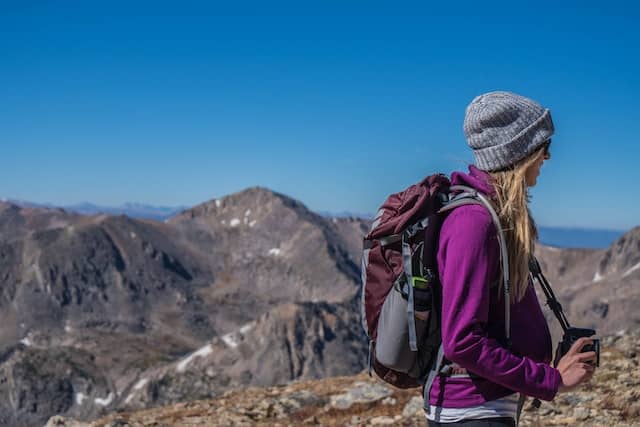
Like ballistic nylon, ripstop nylon has a unique weaving pattern that gives it excellent properties as a backpack fabric. Many big companies across the globe are using this fabric to make backpacks and other items.
It has an eccentric grid pattern that sets it apart from other nylons. Due to its resilient properties, it is popular among hikers and campers, as it can carry many things without tears.
Pros
- It is a durable material that is more wear-resistant than nylon.
- Its grid pattern prevents any tears from growing bigger in case of a tear.
- Ripstop backpacks are lightweight.
Cons
- The material retains heat, hence it is not appropriate for hot environments.
- Even though the grid pattern helps prevent tears from growing, it also exposes the fabric to abrasions.
Cordura
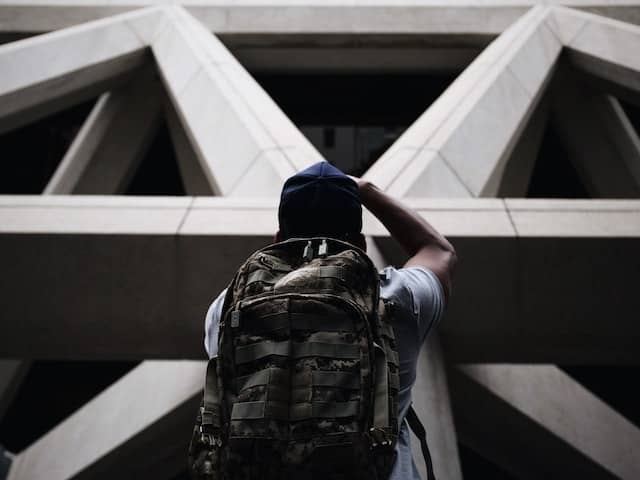
Cordura is also a synthetic material made of nylon and cotton. It is recognized as a brand rather than a fabric. Cordura was developed by the company (DuPont) for its products, but it quickly gained popularity on the market.
Nowadays, Cordura is used to make backpacks due to its favorable qualities.
Pros
- It is a very dense material, making it hard to puncture.
- Cordura has waterproof properties since the majority of the material is nylon.
- It is resistant to wear and hence lasts long.
Cons
- It is expensive
- It is a high-end fabric, meaning it is pricey.
- Cordura is not readily available. If you want to sell these, it is best to work with a sourcing company to help you find a supplier.
- It is a heavy fabric.
Polyester
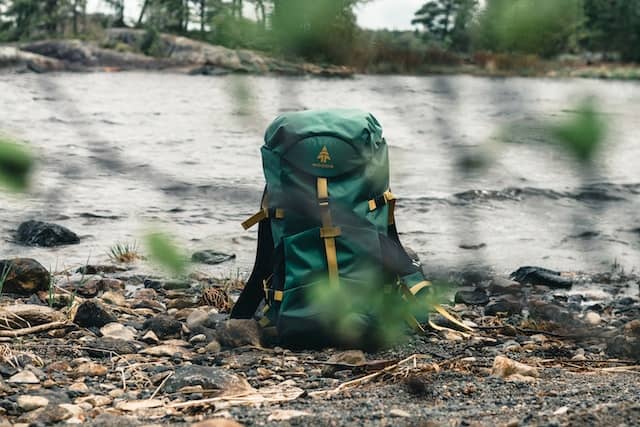
Polyester is also a best-selling material in this industry. It is a plastic-based material that has favorable properties for making backpacks. Polyester is weaker than nylon, but this property is not necessarily a setback.
Since it is a lighter material, some suppliers have found a way of weaving more of its thread to create a rugged and more durable fabric to make backpacks. The products end up being resilient but still lightweight.
Pros
- Unlike nylon, polyester is resistant to UV rays.
- It is also water-repellent, meaning gadgets and other valuables will be kept safe.
- It is very affordable.
- Polyester is a flexible fabric that allows designers to create unique backpacks.
- Dries fast when exposed to water and other liquids.
Cons
- Polyester is very sensitive to high temperatures; avoid hot weather to prevent damage.
- It is a non-breathable material; avoid carrying products that need aeration.
- Stains on polyester are hard to remove.
- Polyester wrinkles easily.
Leather
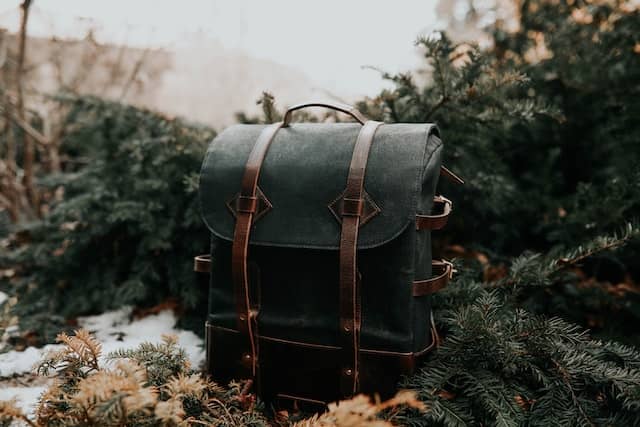
Leather is among the oldest fabrics to be used, even before civilization. Currently, leather is applicable in making shoes, clothes, belts, backpacks, etc.
Genuine leather comes from animal skin. You have to dry or process the material for easy manipulation. Leather comes from various animals, such as cows, pigs, sheep, goats, horses, etc.
Pros
- Leather is a quality and fashionable fabric that attracts several customers.
- It is a very durable material.
- It provides comfort and a sense of professionalism.
- It is a high-end fabric.
Cons
- It is a hefty material.
- Leather requires a lot of maintenance to retain its quality.
- It is not a water-repellent material.
- Some customers won’t consider leather as it is associated with animal cruelty.
Vegan Leather
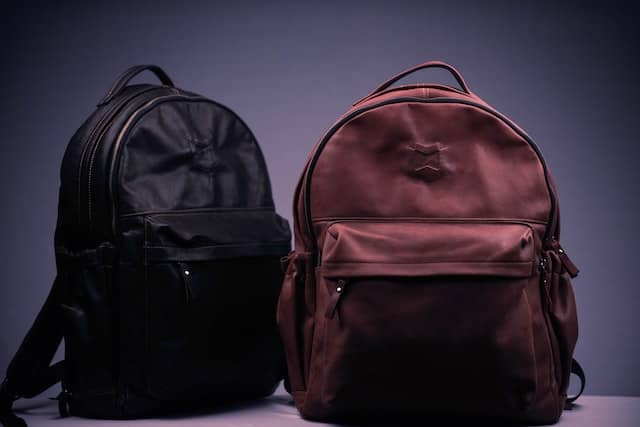
Vegan leather is a material that imitates regular leather but is not made from animal skin. The fabric was created to cater to those who don’t use leather. Vegan leather comes from plants or plastic.
Pineapple and apple skins are examples of natural raw materials for this leather. Although it is not as good as genuine leather, it has some properties that make it a good fit to make backpacks.
Pros
- It is cost-effective; caters to a majority of the population.
- It is more repellent to water than genuine leather.
- Vegan leather is sturdy and long-lasting.
Cons
- It is not as strong as genuine leather.
Cotton Canvas
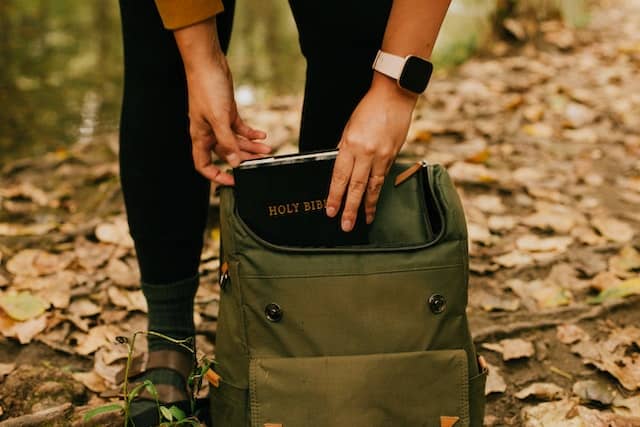
This fabric is not common as it used to be; however, it is also a good option for making backpacks. Nowadays, cotton canvas backpacks can be found under high-end brands since they have a nice aesthetic.
Pros
- It is a trendy fabric that is popular in the fashion industry.
- Cotton canvas is a sturdy fabric, although not the strongest available.
Cons
- It is expensive. Consider buying from wholesale distributors if you want to sell cotton canvas backpacks.
- Cotton canvas is permeable to water.
- It is not a durable material; it wears faster than other materials.
- Cotton canvas is airtight.
PVC
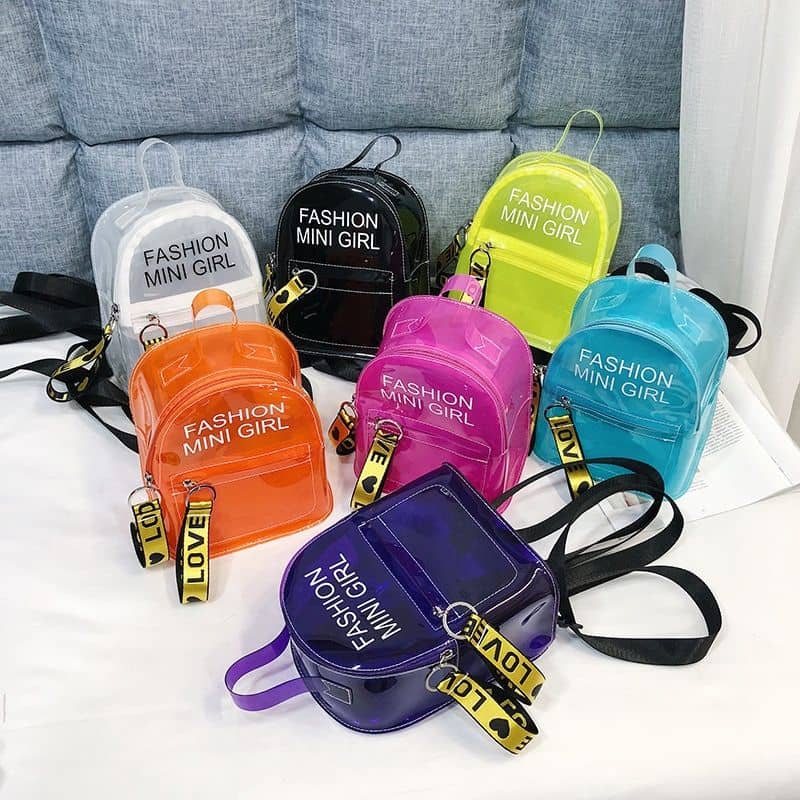
Polyvinyl chloride (PVC) is a synthetic fabric used to make several products. It is a very versatile material that can be used to make various designs.
PVC backpacks will give you an edge over other retailers since they come in a variety of colors and can also be transparent. Moreover, PVC can also coat other fabrics to provide waterproofing properties.
Pros
- It is very cheap.
- Permits variety in terms of color.
- It is fully waterproof.
- It is a lightweight fabric.
- It is durable.
Cons
- It does not stretch; it limits one from carrying some items.
- PVC is not sturdy, so you should avoid heavy loads.
- It easily catches dirt.
Denim
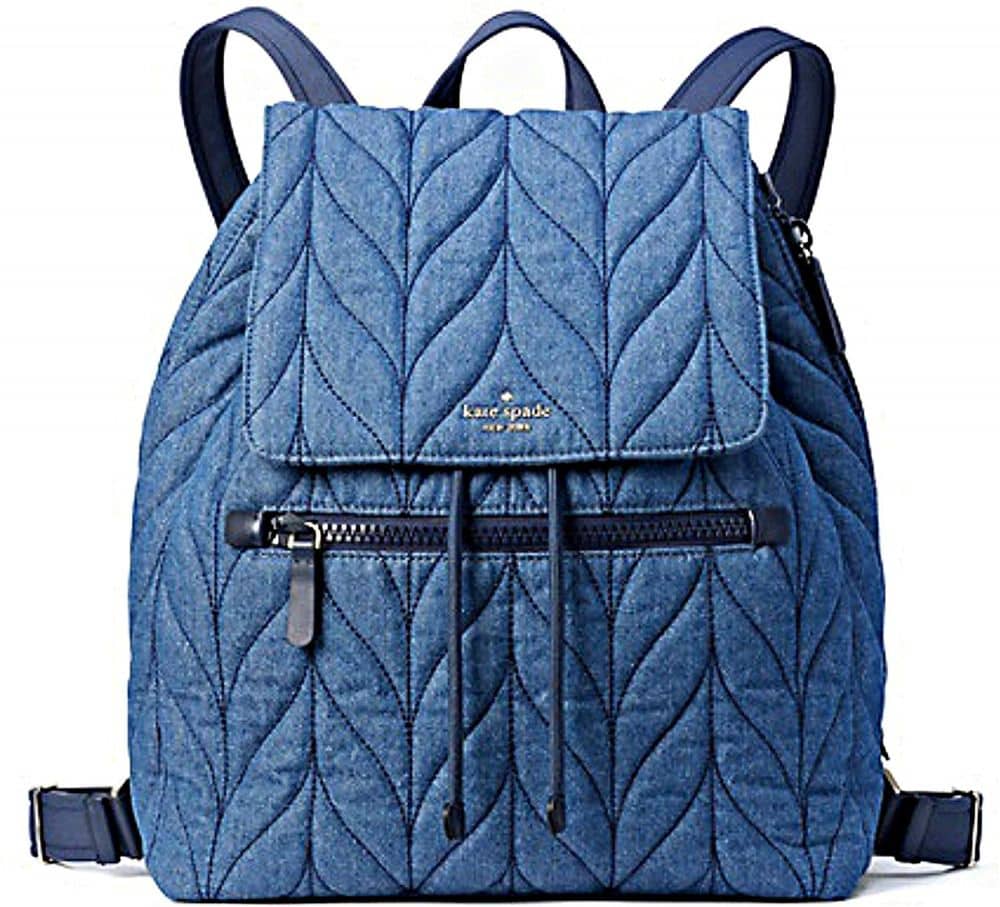
Denim is also a popular fabric in the fashion sector. The fabric is used to make different types of apparel that never go out of fashion.
In recent years, companies started making various types of bags using denim. Denim backpacks are trendy and have a unique feel and look. Denim is also a type of cotton with a different weave.
Pros
- It is a very stylish backpack material.
- It is cost-effective, meaning anybody can own one.
- It is easy to wash (machine washable).
Cons
- It is not resistant to water.
- The dye does not hold forever.
- Avoid heavy luggage since denim is weaker than other fabrics.
FAQs about Backpack Materials
What Exactly Is PU Coating?
PU stands for polyurethane. It is a synthetic material used to coat other backpack materials to give them water-resistance ability.
When you see a backpack with “PU” in its description, it means the main fabric has a polyurethane coating.
How Much Weight Is Safe for a Backpack?
Depending on the material, backpacks should carry at most 30 to 40 pounds. Fabrics such as nylon, leather, ripstop nylon, etc., can carry heavier loads, while PVC and others are prone to tears.
Also, you should consider your weight to determine the load you can safely carry on your back.
What Is the Most Durable Backpack Material?
Nylon is the most durable fabric for making backpacks. It is strong, water-resistant, abrasion-resistant, and lightweight.
Its superior qualities make it more resilient and, hence, last longer than other materials.
Conclusion
Every useful piece of information will come in handy when dealing with customers to help them decide what to buy. It is your responsibility as a retailer to make the process bearable. Having a variety of options in your store is one way to accomplish this.
At NicheSources, we are excited to work with you as you start your business from the ground up. We will connect you with the best suppliers on the market and negotiate the best prices for you.
Learn more about what we have to offer by requesting a free quote, and watch your store become the most talked about.
